이 기사는 해외 석학 기고글 플랫폼 '헤럴드 인사이트 컬렉션'에 게재된 기사입니다.
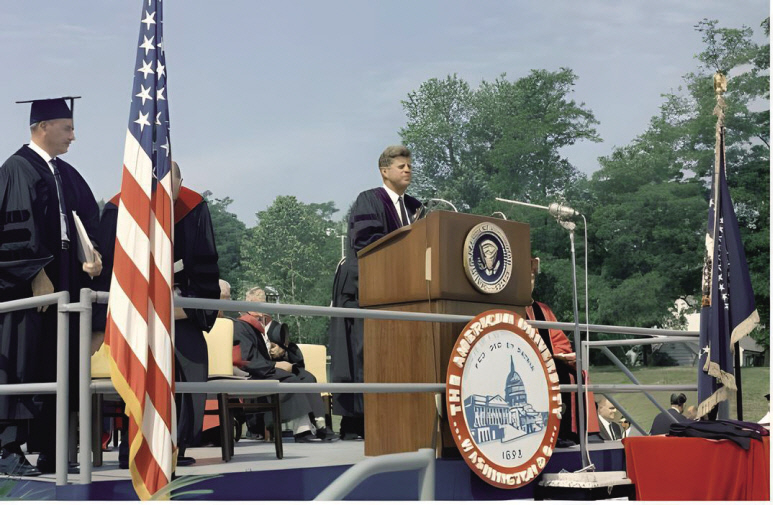 |
| 존 F 케네디 전 미국 대통령이 1963년 6월 10일 아메리칸대학 학위수여식에 서 세계 평화와 핵 군축에 대한 연설을 하고 있다. [존 F 케네디 도서관 재단] |
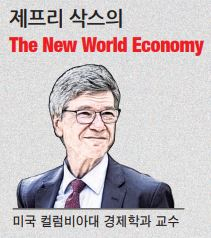
존 F 케네디(JFK) 미국 대통령은 위대한 ‘피스메이커(peacemaker)’였다. 쿠바 미사일 위기의 평화적 해결을 이끌었고 냉전이 한창일 때 소련과 부분적 핵실험 금지 조약을 성공적으로 협상했다. 또 케네디는 암살되기 전까지 ‘미국의 베트남 개입을 중단하기 위한 조치’를 취하고 있었다.
지금으로부터 60년 전인 1963년 6월 10일, 케네디는 더할 나위 없이 탁월한 평화 연설을 통해 소련과의 평화공식을 제시했다. 케네디의 평화 연설은 우크라이나-러시아 전쟁에 대한 조 바이든 대통령의 접근 방식에 얼마나 극적인 방향 전환이 필요한가를 잘 보여준다. 지금까지 바이든 대통령은 평화 달성을 위해 케네디가 권고한 교훈을 따르지 않았지만 케네디의 조언에 귀를 기울인다면 바이든 대통령도 피스메이커가 될 수 있을 것이다. 수학자라면 JFK의 연설을 평화 달성방법에 대한 ‘구성적 증명’이라고 할 것이다. 연설 자체가 미국과 소련이 1963년 서명한 부분적 핵실험 금지 조약에 직접적으로 기여했기 때문이다.
연설을 들은 후 소련의 최고 지도자였던 니키타 흐루시초프는 케네디의 러시아특사 애버렐 해리먼에게 프랭클린 D 루스벨트 이후 미국 대통령이 한 연설 중 가장 위대한 연설이었으며, 케네디와 함께 평화를 추구하고 싶다고 말했다.
이 연설에서 케네디는 평화를 ‘합리적 인간의 합리적이고 필요한 목적’이라고 묘사하면서도 평화를 이루는 게 쉽지 않음을 인정했다.
“평화의 추구가 전쟁의 추구만큼 극적일 수 없음을 알고 있고, 그래서 종종 평화를 추구하는 사람의 말에 귀를 기울이는 사람이 별로 없을 때도 있지만 이보다 더 시급한 일은 없다.”
케네디의 시각에서 평화를 이룰 수 있는 가장 근본적인 열쇠는 양측 모두 평화를 바란다는 사실이다. 케네디는 ‘우리가 갈등을 상대편 탓으로만 돌리려는 덫, 또는 상대편만이 그 태도와 행동을 바꿔야 한다고 주장하는 덫에 빠지기 쉽다’고 경고한다.
케네디는 분명하게 이야기했다.
“우리가 개인으로서, 또 한 국가의 국민으로서 우리 자신의 태도를 되돌아봐야 한다. 우리의 태도는 그들의 태도 못지않게 대단히 중요하기 때문이다.”
케네디는 냉전 당시 팽배했던 비관주의, 즉 ‘소련과 평화는 불가능하다’는 생각을 비난했다.
“그런 생각은 ‘전쟁이란 불가피하며, 인류는 숙명적으로 멸망하게 돼 있고, 우리는 우리가 어찌할 수 없는 힘 때문에 꼼짝할 수 없다’는 결론으로 귀결된다. 우리는 그러한 견해를 받아들일 필요가 없다. 우리의 문제는 인간에 의해 초래됐으므로 인간이 해결할 수 있다.”
케네디는 결정적으로 우리는 “왜곡되고 절망적인 면만을 보지 말아야 한다”고 말했다. 케네디는 “갈등을 불가피한 것으로 생각하지 말고, 화해를 불가능한 것으로만 보지 말며, 의사소통을 단순한 위협의 교환으로만 보지 말아야 한다”고 했다.
그는 또한 “러시아 사람들이 과학·우주 분야에서, 경제 및 사업 발전에서, 문화와 용기 있는 행동에서 많은 업적을 올린 것에 찬사를 보내야 한다”고 말했다.
케네디는 ‘핵을 가진 상대방을 궁지에 몰아 절박한 행동으로 이끌어서는 안 된다’고 경고했다.
“무엇보다 우리의 중요한 이익을 지키면서도 핵 강대국들은 상대방을 굴욕적인 후퇴 아니면 핵전쟁을 택할 수밖에 없게 하는 대결은 피해야 한다. 핵 시대에 그런 노선을 택한다는 것은 우리 정책이 실패했다는, 아니면 전 세계가 모두 죽기를 바라고 있다는 증거밖에 되지 않는다.”
케네디는 ‘평화가 미국과 소련 양측 모두에 이익이 되기 때문에 평화조약 체결이 가능하다’고 믿었다.
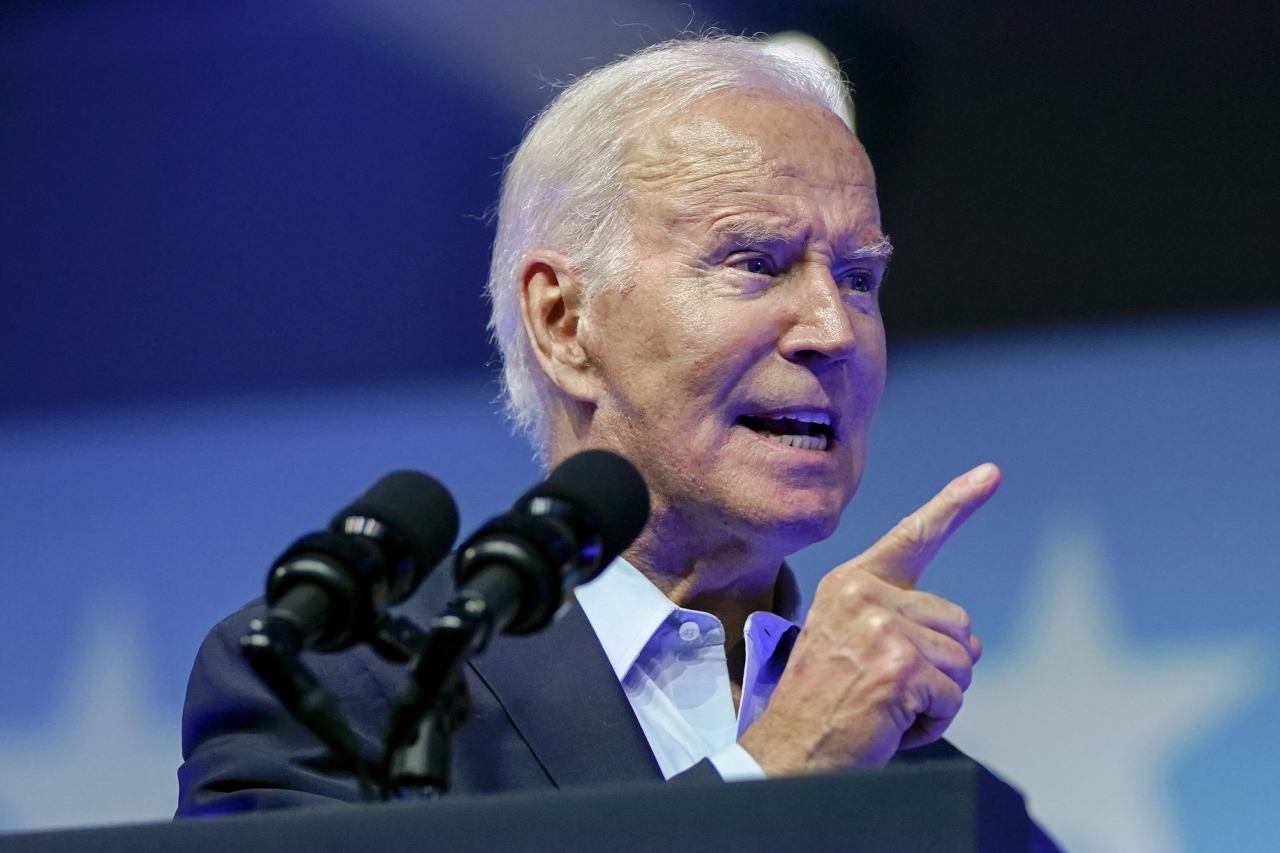 |
| 조 바이든 미국 대통령이 6월 17일 필라델피아 컨벤션센터에서 열린 정치 집회에서 연설하고 있다. [AP] |
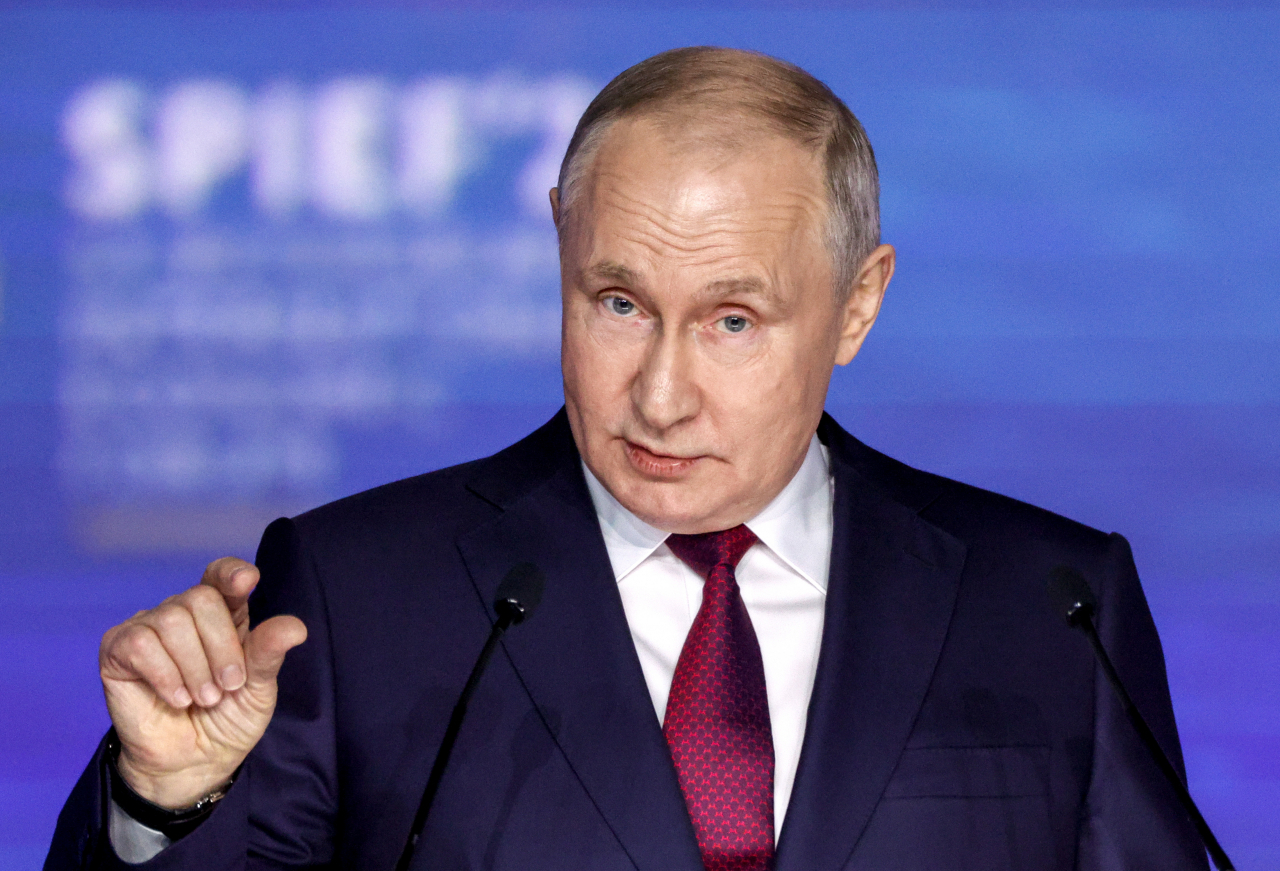 |
| 블라디미르 푸틴 러시아 대통령이 6월 16일 상트페테르부르크 국제경제 포럼 전체회의에서 연설하고 있다. [타스] |
소련이 평화조약을 준수하지 않을 것이란 의견에 대해 케네디는 다음과 같이 말했다.
“미국과 그 맹방, 소련과 그 맹방은 다 같이 정당하고 순수한 평화에 대해, 그리고 군비 경쟁을 막는 것에 대해 서로 깊은 이해관계가 있다. 이 목적을 위한 합의가 이뤄진다면 우리뿐 아니라 소련에도 이익이 되며, 심지어 가장 적대적인 국가들도 그런 조약 의무를 받아들여 지킬 것으로 믿을 수 있다. 다만, 그 조약 의무가 그들 자신에게 이익이 되는 것이어야 한다.”
케네디는 두 적대국 간 직접적인 의사소통의 중요성을 강조했다. 평화를 위해서는 “소련과 우리 사이에 더 깊은 이해가 필요할 것이고, 더 깊은 이해를 위해서는 더 많은 접촉과 의사소통이 필요할 것이다. 위험한 상황으로 이어질 수 있는 의사소통의 지연과 오해, 또 한쪽이 다른 쪽의 행동을 잘못 해석하는 상황을 양측 모두에서 피하기 위해 모스크바와 워싱턴 사이에 직통전화를 놓는 것이 이 방향으로 나아가기 위한 하나의 단계가 될 수 있다.”
우크라이나 전쟁과 관련해 바이든 대통령은 JFK와 거의 정반대로 행동했다. 바이든 대통령은 개인적으로, 또 반복적으로 블라디미르 푸틴 러시아 대통령을 폄하했다. 바이든 행정부는 미국의 전쟁 목표를 ‘러시아의 약화’로 정의했다. 바이든 대통령은 푸틴 대통령과의 모든 의사소통을 피했다. 두 지도자는 2022년 2월 이후 단 한 번도 대화를 나눈 적이 없고, 바이든 대통령은 지난해 인도네시아 발리에서 열린 ‘주요 20개국(G20) 정상회의’에서 푸틴 대통령과의양자회담을 거부했다.
바이든 대통령은 러시아의 깊은 안보 우려를 다루기는커녕 인정하기조차 거부했다. 푸틴 대통령은 계속해서 ‘북대서양조약기구(NATO·나토)가 러시아와 약 2000㎞의 육상 국경을 맞대고 있는 우크라이나로 확장하는 것을 강력하게 반대한다’는 뜻을 표명했다. 멕시코와 2000마일에 달하는 육상 국경을 둔 미국도 멕시코·러시아 또는 멕시코·중국 간 군사동맹을 절대 용납하지 않을 것이다.
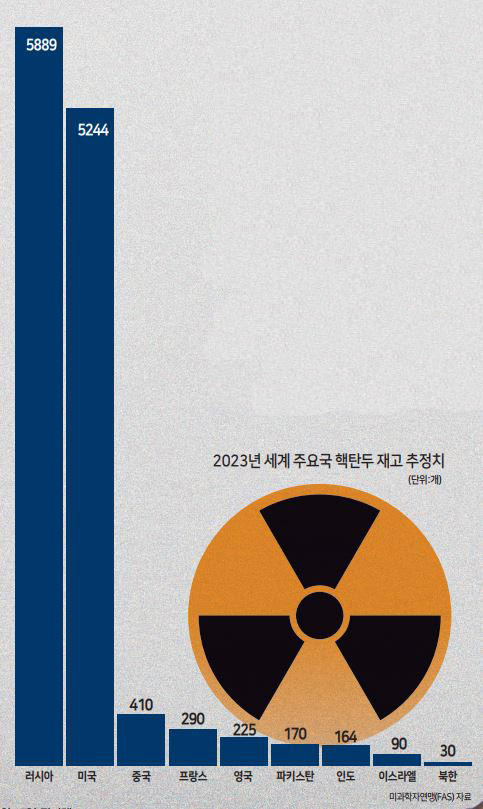
이제 바이든 대통령은 우크라이나 전쟁 종식을 위한 광범위한 협상의 일환으로 러시아와 나토 확장에 대해 협상해야 할 것이다.
케네디는 1961년 1월 취임 당시, 협상에 대한 자신의 입장을 분명히 밝혔다.
“두려움 때문에 협상하지 말자. 그렇다고 협상하는 것을 두려워하지도 말자. 두 진영을 분열시키는 문제에 대해 장황하게 논쟁하기보다는 어떤 것들이 우리를 하나로 묶어주는가를 살펴보자.”
JFK는 그의 평화 연설에서 미국과 러시아의 공동의 유대가 “우리 모두가 이 조그마한 지구에 살고 있다는 사실”이라는 점을 상기시켜 줬다.
“우리는 모두 같은 공기를 마시고 산다. 우리는 모두 우리 자녀의 미래를 소중히 여기고, 우리 모두는 언젠가는 죽어야 하는 존재다.”
제프리 삭스 미국 컬럼비아대 교수
How JFK Would Pursue Peace in Ukraine
Jeffrey D. Sachs
President John F. Kennedy was one of the world’s great peacemakers. He led a peaceful solution to the Cuban Missile Crisis and then successfully negotiated the Partial Nuclear Test Ban Treaty with the Soviet Union at the very height of the Cold War. At the time of his assassination, he was taking steps to end US involvement in Vietnam.
In his dazzling and unsurpassed Peace Speech, delivered exactly sixty years ago on June 10, 1963, Kennedy laid out his formula for peace with the Soviet Union. Kennedy’s Peace Speech highlights how Joe Biden’s approach to Russia and the Ukraine War needs a dramatic reorientation. Until now, Biden has not followed the precepts that Kennedy recommended to find peace. By heeding Kennedy’s advice, Biden too could become a peacemaker.
A mathematician would call JFK’s speech a “constructive proof” of how to make peace, since the speech itself contributed directly to the Partial Nuclear Test Ban Treaty signed by the US and Soviet Union in July 1963. Upon receipt of the speech, Soviet leader Nikita Khrushchev told Kennedy’s envoy to Russia, Averell Harriman, that the speech was the greatest by an American president since Franklin D. Roosevelt, and that he wanted to pursue peace with Kennedy.
In the speech, Kennedy describes peace “as the necessary rational end [goal] of rational men.” Yet he acknowledges that peacemaking is not easy: “I realize that the pursuit of peace is not as dramatic as the pursuit of war—and frequently the words of the pursuer fall on deaf ears. But we have no more urgent task.”
The deepest key to peace, in Kennedy’s view, is the fact that both sides want peace. It is easy to fall into the trap, warns Kennedy, of blaming a conflict only on the other side. It is easy to fall into the trap of insisting that only the adversary should change their attitudes and behavior. Kennedy is very clear: “we must reexamine our own attitude—as individuals and as a Nation—for our attitude is as essential as theirs.”
Kennedy attacked the prevailing pessimism at the height of the Cold War that peace with the Soviet Union was impossible, “that war is inevitable—that mankind is doomed—that we are gripped by forces we cannot control. We need not accept that view. Our problems are man-made—therefore, they can be solved by man.”
Crucially, said Kennedy, we must not “see only a distorted and desperate view of the other side.” We must not “see conflict as inevitable, accommodation as impossible, and communication as nothing more than an exchange of threats.” Indeed, said Kennedy, we should “hail the Russian people for their many achievements—in science and space, in economic and industrial growth, in culture and in acts of courage.”
Kennedy warned against putting a nuclear adversary into a corner that could lead the adversary to desperate actions. “Above all, while defending our own vital interests, nuclear powers must avert those confrontations which bring an adversary to a choice of either a humiliating retreat or a nuclear war. To adopt that kind of course in the nuclear age would be evidence only of the bankruptcy of our policy—or of a collective death-wish for the world.”
Kennedy knew that since peace was in the mutual interest of the US and the Soviet Union, a peace treaty could be reached. To those who said that the Soviet Union would not abide by a peace treaty, Kennedy responded that “both the United States and its allies, and the Soviet Union and its allies, have a mutually deep interest in a just and genuine peace and in halting the arms race. Agreements to this end are in the interests of the Soviet Union as well as ours— and even the most hostile nations can be relied upon to accept and keep those treaty obligations, and only those treaty obligations, which are in their own interest.”
Kennedy emphasized the importance of direct communications between the two adversaries. Peace, he said, “will require increased understanding between the Soviets and ourselves. And increased understanding will require increased contact and communication. One step in this direction is the proposed arrangement for a direct line between Moscow and Washington, to avoid on each side the dangerous delays, misunderstandings, and mis-readings of the other’s actions which might occur at a time of crisis.”
In the context of the Ukraine War, Biden has behaved almost the opposite of JFK. He has personally and repeatedly denigrated Russian President Vladimir Putin. His administration has defined the US war aim as the weakening of Russia. Biden has avoided all communications with Putin. They have apparently not spoken once since February 2022, and Biden rebuffed a bilateral meeting with Putin at last year’s G20 Summit in Bali, Indonesia.
Biden has refused to even acknowledge, much less to address, Russia’s deep security concerns. Putin repeatedly expressed Russia’s ardent opposition to NATO enlargement to Ukraine, a country with a 2,000-kilometer border with Russia. The US would never tolerate a Mexican-Russian or Mexican-Chinese military alliance in view of the 2000-mile Mexico-US border. It is time for Biden to negotiate with Russia on NATO enlargement, as part of broader negotiations to end the Ukraine war.
When Kennedy came into office in January 1961, he stated clearly his position on negotiations: “Let us never negotiate out of fear. But let us never fear to negotiate. Let both sides explore what problems unite us instead of belaboring those problems which divide us.” In his Peace Speech, JFK reminded us that what unites the US and Russia is that “we all inhabit this small planet. We all breathe the same air. We all cherish our children’s future. And we are all mortal.”








